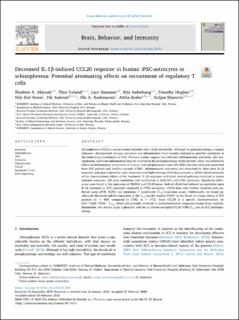| dc.contributor.author | Akkouh, Ibrahim | |
| dc.contributor.author | Ueland, Thor | |
| dc.contributor.author | Hansson, Lars | |
| dc.contributor.author | Inderhaug, Elin | |
| dc.contributor.author | Hughes, Timothy | |
| dc.contributor.author | Steen, Nils Eiel | |
| dc.contributor.author | Aukrust, Pål | |
| dc.contributor.author | Andreassen, Ole Andreas | |
| dc.contributor.author | Szabo, Attila | |
| dc.contributor.author | Djurovic, Srdjan | |
| dc.date.accessioned | 2021-04-23T13:19:02Z | |
| dc.date.available | 2021-04-23T13:19:02Z | |
| dc.date.created | 2020-09-22T18:21:15Z | |
| dc.date.issued | 2020 | |
| dc.Published | Brain, behavior, and immunity. 2020, 87 634-644. | |
| dc.identifier.issn | 0889-1591 | |
| dc.identifier.uri | https://hdl.handle.net/11250/2739384 | |
| dc.description.abstract | Schizophrenia (SCZ) is a severe mental disorder with a high heritability. Although its pathophysiology is mainly unknown, dysregulated immune activation and inflammation have recently emerged as possible candidates in the underlying mechanisms of SCZ. Previous studies suggest that aberrant inflammasome activation, glia dysregulation, and brain inflammation may be involved in the pathophysiology of the disorder. Here, we studied the effects of inflammatory modulation on human induced pluripotent stem cell (iPSC)-derived astrocytes generated from SCZ patients and healthy controls (CTRL). Inflammasome activation was mimicked by short-term IL-1β exposure, and gene expression were measured with high-coverage RNA-Seq to ensure a global characterization of the transcriptional effects of the treatment. IL-1β exposure modulated several pathways involved in innate immune responses, cell cycle regulation, and metabolism in both SCZ and CTRL astrocytes. Significant differences were found in the expression of HILPDA and CCL20 genes, both of which had reduced up-regulation upon IL-1β treatment in SCZ astrocytes compared to CTRL astrocytes. CCL20 data were further validated and confirmed using qPCR, ELISA, and regulatory T lymphocyte (Treg) migration assays. Additionally, we found significantly decreased mRNA expression of the Treg-specific marker FOXP3 in the blood of a large cohort of SCZ patients (n = 484) compared to CTRL (n = 472). Since CCL20 is a specific chemoattractant for CD4+CD25+CCR6+ Tregs, which are crucially involved in anti-inflammatory responses during brain (auto)inflammation, our results imply a plausible role for an altered astroglia-CCL20-CCR6-Treg axis in SCZ pathophysiology. | en_US |
| dc.language.iso | eng | en_US |
| dc.publisher | Elsevier | en_US |
| dc.rights | Navngivelse 4.0 Internasjonal | * |
| dc.rights.uri | http://creativecommons.org/licenses/by/4.0/deed.no | * |
| dc.title | Decreased IL-1β-induced CCL20 response in human iPSC-astrocytes in schizophrenia: Potential attenuating effects on recruitment of regulatory T cells | en_US |
| dc.type | Journal article | en_US |
| dc.type | Peer reviewed | en_US |
| dc.description.version | publishedVersion | en_US |
| dc.rights.holder | Copyright 2020 The Authors | en_US |
| cristin.ispublished | true | |
| cristin.fulltext | original | |
| cristin.qualitycode | 2 | |
| dc.identifier.doi | 10.1016/j.bbi.2020.02.008 | |
| dc.identifier.cristin | 1832285 | |
| dc.source.journal | Brain, behavior, and immunity | en_US |
| dc.source.40 | 87 | |
| dc.source.pagenumber | 634-644 | en_US |
| dc.identifier.citation | Brain, behavior, and immunity. 2020, 87:634-644 | en_US |
| dc.source.volume | 87 | en_US |

